Unit1 Friendship重点知识清单译林版(2024)英语八年级上册
文档属性
| 名称 | Unit1 Friendship重点知识清单译林版(2024)英语八年级上册 |
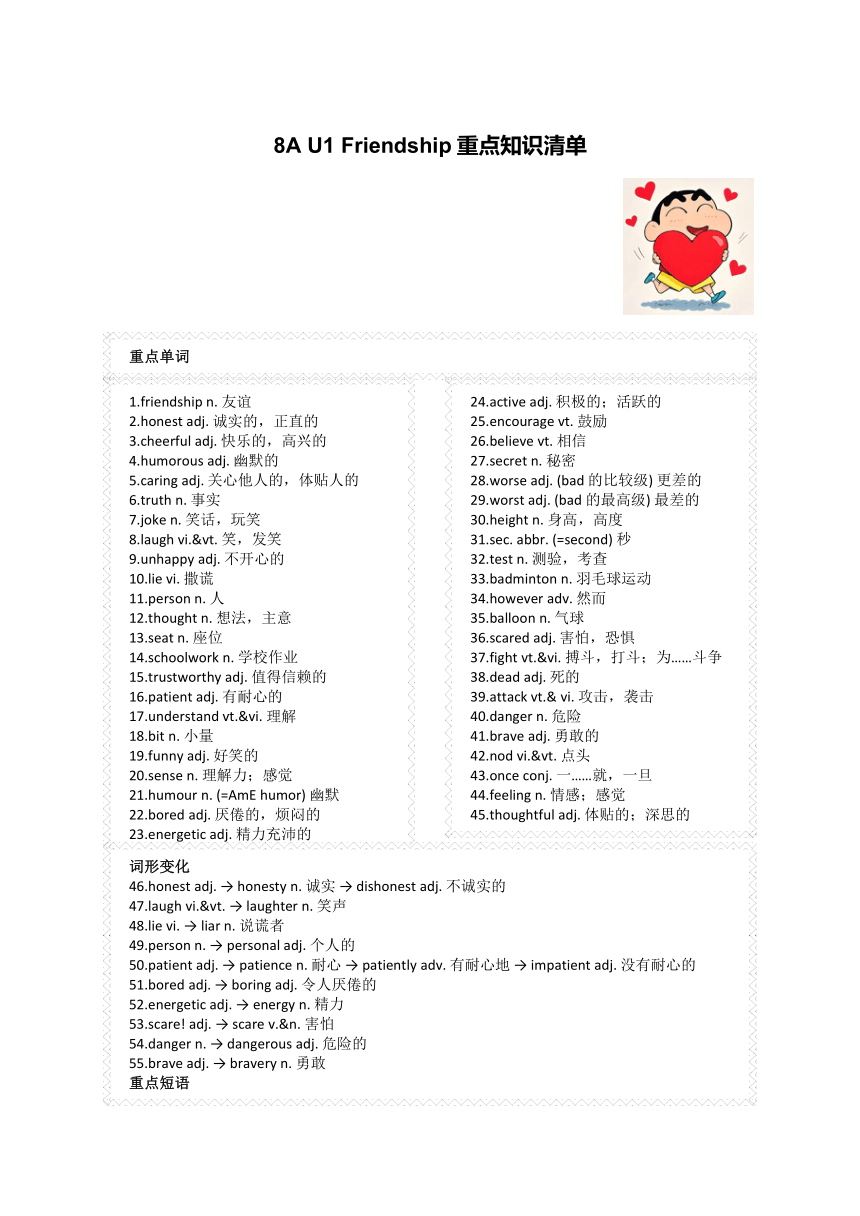
|
|
| 格式 | docx | ||
| 文件大小 | 620.1KB | ||
| 资源类型 | 教案 | ||
| 版本资源 | 译林版 | ||
| 科目 | 英语 | ||
| 更新时间 | 2025-08-20 00:00:00 | ||
图片预览

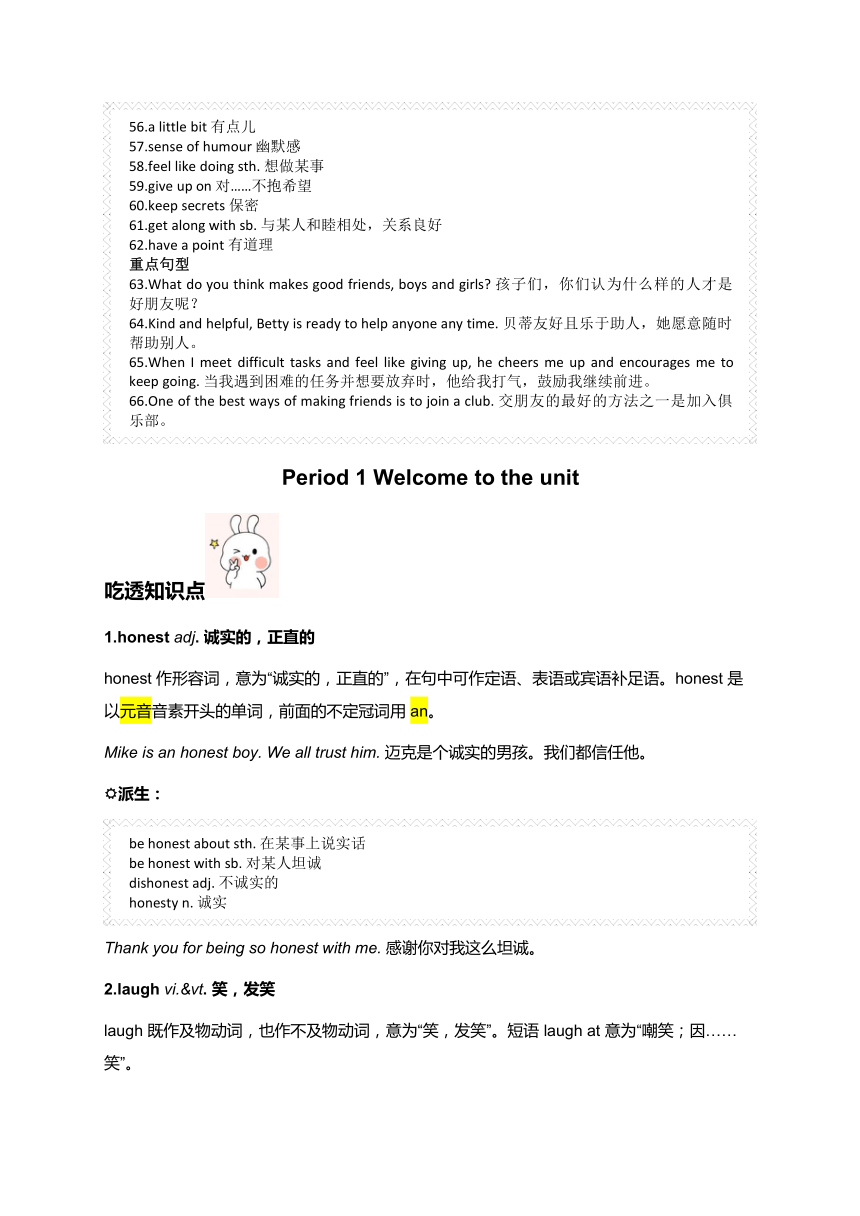
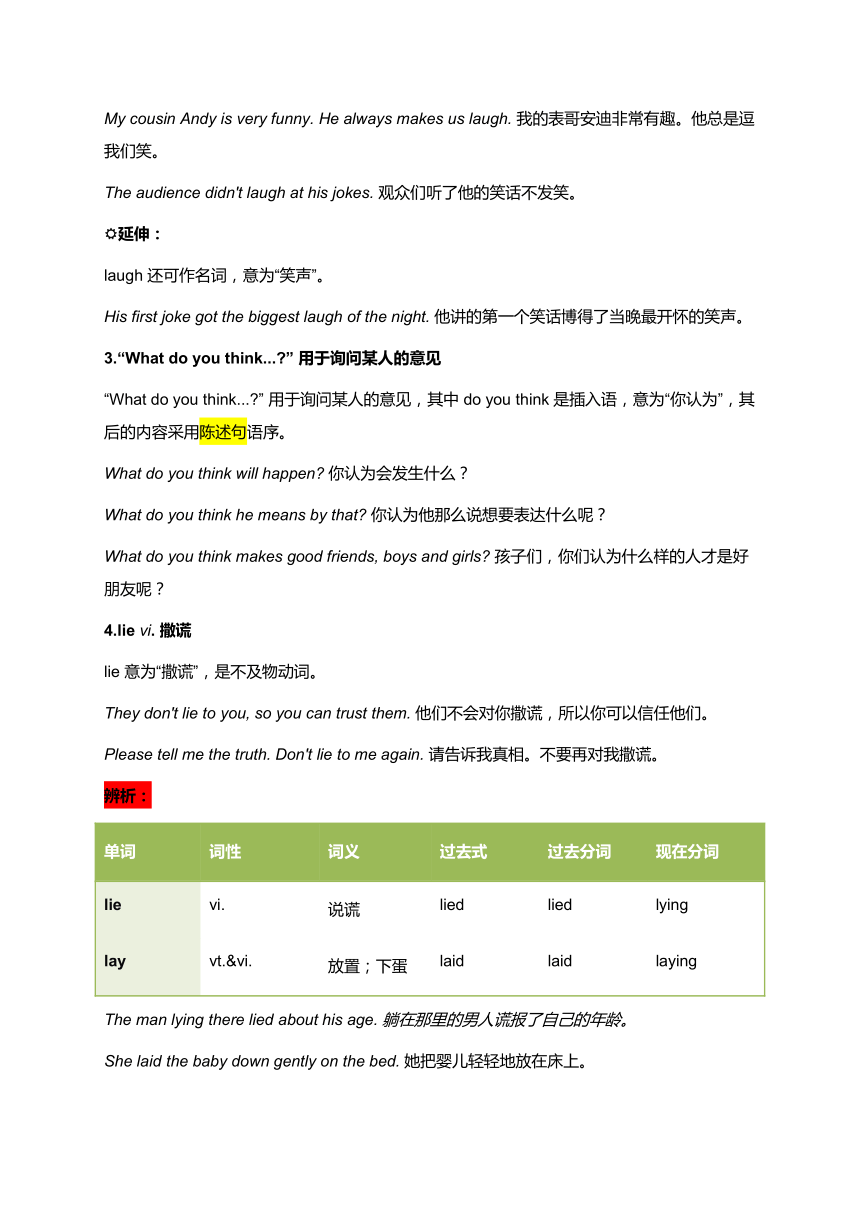
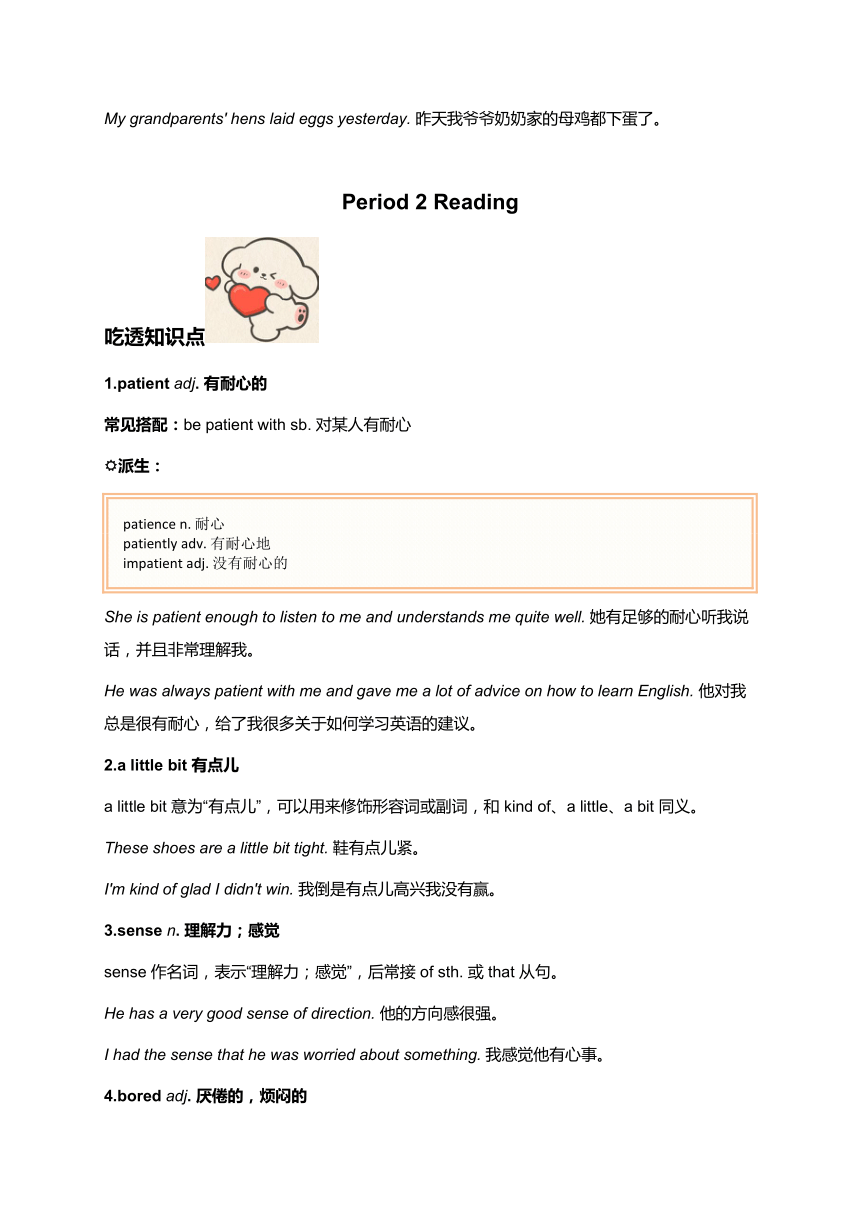
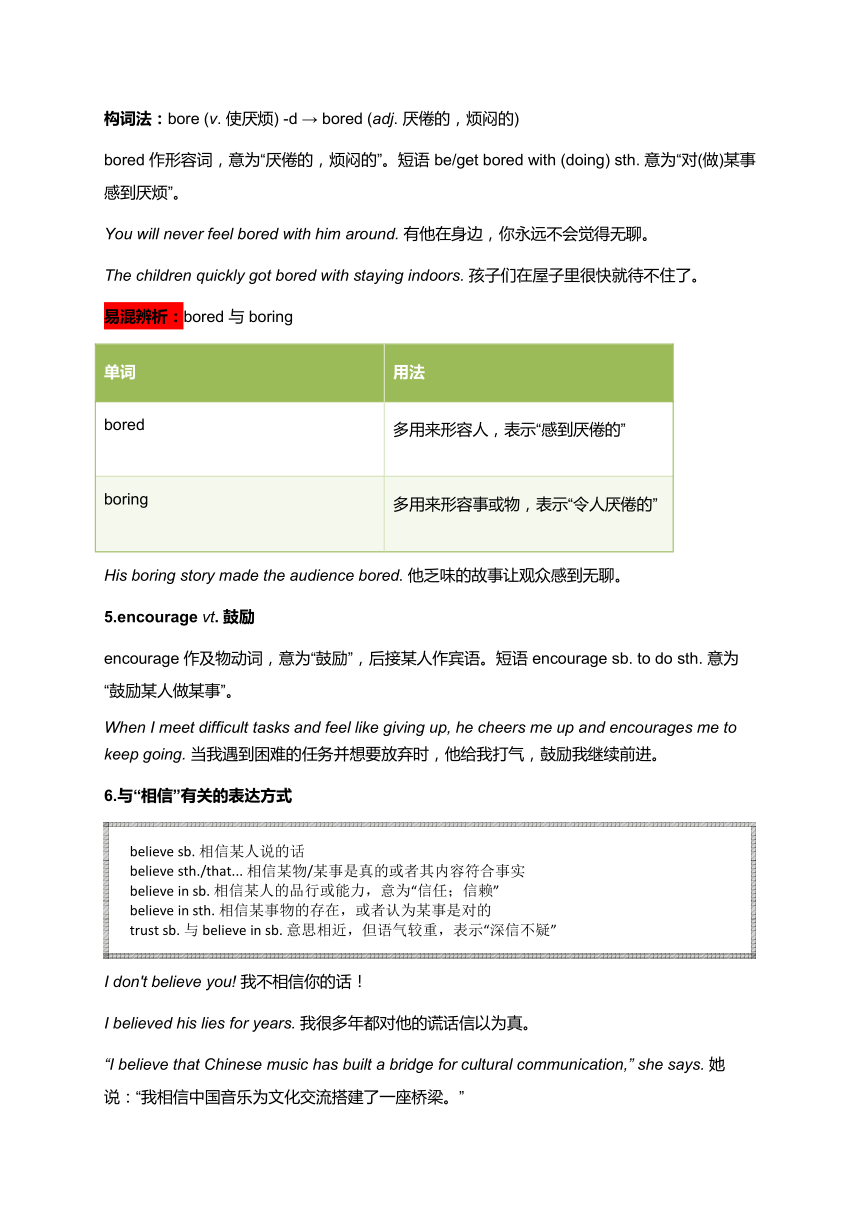
文档简介
8A U1 Friendship重点知识清单
重点单词
1.friendship n. 友谊
2.honest adj. 诚实的,正直的
3.cheerful adj. 快乐的,高兴的
4.humorous adj. 幽默的
5.caring adj. 关心他人的,体贴人的
6.truth n. 事实
7.joke n. 笑话,玩笑
8.laugh vi.&vt. 笑,发笑
9.unhappy adj. 不开心的
10.lie vi. 撒谎
11.person n. 人
12.thought n. 想法,主意
13.seat n. 座位
14.schoolwork n. 学校作业
15.trustworthy adj. 值得信赖的
16.patient adj. 有耐心的
17.understand vt.&vi. 理解
18.bit n. 小量
19.funny adj. 好笑的
20.sense n. 理解力;感觉
21.humour n. (=AmE humor) 幽默
22.bored adj. 厌倦的,烦闷的
23.energetic adj. 精力充沛的
24.active adj. 积极的;活跃的
25.encourage vt. 鼓励
26.believe vt. 相信
27.secret n. 秘密
28.worse adj. (bad 的比较级) 更差的
29.worst adj. (bad 的最高级) 最差的
30.height n. 身高,高度
31.sec. abbr. (=second) 秒
32.test n. 测验,考查
33.badminton n. 羽毛球运动
34.however adv. 然而
35.balloon n. 气球
36.scared adj. 害怕,恐惧
37.fight vt.&vi. 搏斗,打斗;为……斗争
38.dead adj. 死的
39.attack vt.& vi. 攻击,袭击
40.danger n. 危险
41.brave adj. 勇敢的
42.nod vi.&vt. 点头
43.once conj. 一……就,一旦
44.feeling n. 情感;感觉
45.thoughtful adj. 体贴的;深思的
词形变化
46.honest adj. → honesty n. 诚实 → dishonest adj. 不诚实的
47.laugh vi.&vt. → laughter n. 笑声
48.lie vi. → liar n. 说谎者
49.person n. → personal adj. 个人的
50.patient adj. → patience n. 耐心 → patiently adv. 有耐心地 → impatient adj. 没有耐心的
51.bored adj. → boring adj. 令人厌倦的
52.energetic adj. → energy n. 精力
53.scare! adj. → scare v.&n. 害怕
54.danger n. → dangerous adj. 危险的
55.brave adj. → bravery n. 勇敢
重点短语
56.a little bit 有点儿
57.sense of humour 幽默感
58.feel like doing sth. 想做某事
59.give up on 对……不抱希望
60.keep secrets 保密
61.get along with sb. 与某人和睦相处,关系良好
62.have a point 有道理
重点句型
63.What do you think makes good friends, boys and girls 孩子们,你们认为什么样的人才是好朋友呢?
64.Kind and helpful, Betty is ready to help anyone any time. 贝蒂友好且乐于助人,她愿意随时帮助别人。
65.When I meet difficult tasks and feel like giving up, he cheers me up and encourages me to keep going. 当我遇到困难的任务并想要放弃时,他给我打气,鼓励我继续前进。
66.One of the best ways of making friends is to join a club. 交朋友的最好的方法之一是加入俱乐部。
Period 1 Welcome to the unit
吃透知识点
1.honest adj. 诚实的,正直的
honest 作形容词,意为“诚实的,正直的”,在句中可作定语、表语或宾语补足语。honest 是以元音音素开头的单词,前面的不定冠词用 an。
Mike is an honest boy. We all trust him. 迈克是个诚实的男孩。我们都信任他。
派生:
be honest about sth. 在某事上说实话
be honest with sb. 对某人坦诚
dishonest adj. 不诚实的
honesty n. 诚实
Thank you for being so honest with me. 感谢你对我这么坦诚。
2.laugh vi.&vt. 笑,发笑
laugh 既作及物动词,也作不及物动词,意为“笑,发笑”。短语 laugh at 意为“嘲笑;因……笑”。
My cousin Andy is very funny. He always makes us laugh. 我的表哥安迪非常有趣。他总是逗我们笑。
The audience didn't laugh at his jokes. 观众们听了他的笑话不发笑。
延伸:
laugh 还可作名词,意为“笑声”。
His first joke got the biggest laugh of the night. 他讲的第一个笑话博得了当晚最开怀的笑声。
3.“What do you think... ” 用于询问某人的意见
“What do you think... ” 用于询问某人的意见,其中 do you think 是插入语,意为“你认为”,其后的内容采用陈述句语序。
What do you think will happen 你认为会发生什么?
What do you think he means by that 你认为他那么说想要表达什么呢?
What do you think makes good friends, boys and girls 孩子们,你们认为什么样的人才是好朋友呢?
4.lie vi. 撒谎
lie 意为“撒谎”,是不及物动词。
They don't lie to you, so you can trust them. 他们不会对你撒谎,所以你可以信任他们。
Please tell me the truth. Don't lie to me again. 请告诉我真相。不要再对我撒谎。
辨析:
单词 词性 词义 过去式 过去分词 现在分词
lie vi. 说谎 lied lied lying
lay vt.&vi. 放置;下蛋 laid laid laying
The man lying there lied about his age. 躺在那里的男人谎报了自己的年龄。
She laid the baby down gently on the bed. 她把婴儿轻轻地放在床上。
My grandparents' hens laid eggs yesterday. 昨天我爷爷奶奶家的母鸡都下蛋了。
Period 2 Reading
吃透知识点
1.patient adj. 有耐心的
常见搭配:be patient with sb. 对某人有耐心
派生:
patience n. 耐心
patiently adv. 有耐心地
impatient adj. 没有耐心的
She is patient enough to listen to me and understands me quite well. 她有足够的耐心听我说话,并且非常理解我。
He was always patient with me and gave me a lot of advice on how to learn English. 他对我总是很有耐心,给了我很多关于如何学习英语的建议。
2.a little bit 有点儿
a little bit 意为“有点儿”,可以用来修饰形容词或副词,和 kind of、a little、a bit 同义。
These shoes are a little bit tight. 鞋有点儿紧。
I'm kind of glad I didn't win. 我倒是有点儿高兴我没有赢。
3.sense n. 理解力;感觉
sense 作名词,表示“理解力;感觉”,后常接 of sth. 或 that 从句。
He has a very good sense of direction. 他的方向感很强。
I had the sense that he was worried about something. 我感觉他有心事。
4.bored adj. 厌倦的,烦闷的
构词法:bore (v. 使厌烦) -d → bored (adj. 厌倦的,烦闷的)
bored 作形容词,意为“厌倦的,烦闷的”。短语 be/get bored with (doing) sth. 意为“对(做)某事感到厌烦”。
You will never feel bored with him around. 有他在身边,你永远不会觉得无聊。
The children quickly got bored with staying indoors. 孩子们在屋子里很快就待不住了。
易混辨析:bored 与 boring
单词 用法
bored 多用来形容人,表示“感到厌倦的”
boring 多用来形容事或物,表示“令人厌倦的”
His boring story made the audience bored. 他乏味的故事让观众感到无聊。
5.encourage vt. 鼓励
encourage 作及物动词,意为“鼓励”,后接某人作宾语。短语 encourage sb. to do sth. 意为“鼓励某人做某事”。
When I meet difficult tasks and feel like giving up, he cheers me up and encourages me to keep going. 当我遇到困难的任务并想要放弃时,他给我打气,鼓励我继续前进。
6.与“相信”有关的表达方式
believe sb. 相信某人说的话
believe sth./that... 相信某物/某事是真的或者其内容符合事实
believe in sb. 相信某人的品行或能力,意为“信任;信赖”
believe in sth. 相信某事物的存在,或者认为某事是对的
trust sb. 与 believe in sb. 意思相近,但语气较重,表示“深信不疑”
I don't believe you! 我不相信你的话!
I believed his lies for years. 我很多年都对他的谎话信以为真。
“I believe that Chinese music has built a bridge for cultural communication,” she says. 她说:“我相信中国音乐为文化交流搭建了一座桥梁。”
Mrs. Chen believes in all of them and tells them to “go for it”. 陈老师相信他们所有人,并告诉他们“去争取”。
I believe in hard work as the key to success. 我认为努力工作是成功的关键。
I knew I could trust John. 我知道我可以相信约翰。
Period 3 Grammar & Word power
吃透知识点
1.height n. 身高,高度
height 既可作可数名词,也可作不可数名词,意为“身高,高度”。
短语:
短语 含义
be...in height 有……高
be of average height 平均身高
be of medium height 中等身高
It is almost two metres in height. 它差不多有两米高。
My sister is two years younger than me, but we are of the same height now. 我妹妹比我小两岁,但我们现在的身高相同。
2.构词法①:后缀-ful 和-less
后缀-ful“充满……的;有……性质(或倾向)的”和-less“没有;无”可以加在名词后,构成形容词。
名词 形容词
joy 高兴 joyful 高兴的
peace 和平 peaceful 和平的
power 力量 powerful 强大的
aim 目的 aimless 无目的的
job 职业 jobless 失业的
sense 意义 senseless 无意义的
吃透语法
形容词比较级和最高级
大多数形容词有三个等级:原级、比较级和最高级。
(一)形容词比较级的用法
1.形容词比较级用于两个人或事物之间的比较,表示“较……;更……”,常用的结构为“主语 + 系动词 + 形容词比较级 + than + 比较对象”。
Her hair is longer than mine, and she usually wears her hair in a ponytail. 她的头发比我的长,她通常把头发扎成马尾辫。
2.“Which/Who... + 系动词 + 形容词比较级, A or B ” 表示在两者中选择,意为“A 和 B 哪一个/谁更……”。
Which is fiercer, the tiger or the lion 老虎和狮子哪个更凶猛?
3.“比较级 + and + 比较级”表示人或事物本身程度的改变,意为“越来越……”。多音节词和部分双音节词用于此结构时,要用“more and more + 形容词原级”。
His memory is getting worse and worse. 他越来越健忘了。
With the development of science and technology, our life is becoming more and more convenient. 随着科学技术的发展,我们的生活变得越来越方便。
4.比较级的修饰语:much 更加;even 更,甚至;a little 一点;far 远远,更;a lot 很;still 更,还要;a bit 有点。
I felt much better by the end of the evening. 等到了深夜,我感觉好多了。
(二)形容词最高级的用法
1.形容词最高级用于三者或三者以上的人或事物之间的比较,表示“最……”。最高级前通常要加定冠词 the,常用的结构为“主语 + 系动词 + the + 形容词最高级 (+ 名词) + 带有 of、in、among 等表示范围的短语或从句”。
It's the most expensive restaurant in town. 这是城里最贵的餐馆。
2.“one of + the + 形容词最高级 + 可数名词的复数形式”表示“最……的……之一”。
Traditional Chinese painting is one of the oldest art forms in the world. 中国传统绘画是世界上最古老的艺术形式之一。
3.“the + 序数词 + 形容词最高级 + 可数名词的单数形式”表示“第几……”。
Saturn is the second biggest planet in the solar system. 土星是太阳系中第二大的行星。
4.当最高级前有物主代词、名词所有格等修饰时,其前不加 the。
Today is Mary's happiest day. 今天是玛丽最开心的一天。
(三)形容词比较级和最高级的变化规则
形容词比较级和最高级是在形容词原级的基础上进行变化的,分为规则变化和不规则变化。有些形容词有两种比较级和最高级的变化方式。
1.规则变化
分类 规则 示例
单音节词和部分双音节词 大多数词后加-er 或-est fast → faster → fastest
以字母 e 结尾的词后加-r 或-st large → larger → largest
以一个辅音字母结尾的重读闭音节词,双写最后一个辅音字母,再加-er 或-est fat → fatter → fattest
以“辅音字母 + y”结尾的词,去掉 y,再加-ier 或-iest heavy → heavier → heaviest
多音节词和部分双音节词 在词的前面加 more 或 most popular → more popular → most popular
延伸:
多音节形容词前加 less 和 least 也能构成比较级和最高级,但此时分别表示“不那么”和“最不”。
如:important 重要的 → less important 不那么重要的 → least important 最不重要的。
2.常见的不规则变化
原级 比较级 最高级
good better best
well(健康的) better best
bad worse worst
ill worse worst
many more most
much more most
little(少的) less least
far farther/further farthest/furthest
注意:
个别形容词的比较级和最高级有两种形式,在意义上稍有不同。
(1) farther 和 further 都可表示“更远的”,但 further 还可用于表示“更进一步的”“更多的”等抽象含义。
For further information on tomorrow's weather conditions, call the hotline below. 有关明天天气情况的更多信息,请致电以下热线。2024 江苏扬州
(2) older 和 oldest 修饰人或物,在句中作定语或表语,可以和 than 连用。
elder 和 eldest 主要用于表示家庭成员之间的长幼关系,常作定语修饰人,不可和 than 连用。
My elder sister is older than your eldest brother.
我的姐姐比你的大哥年龄大。
Period 4 Integration
吃透知识点
1. fight vt.&vi. 搏斗,打斗;为……斗争
fight 既作及物动词,也作不及物动词,意为“搏斗,打斗;为……斗争”。
短语:
fight sb. for sth. 为了某物和某人竞争
fight with sb. 与某人打架
fight to do sth. 努力做某事
fight for sth. 为某事而奋斗
He sometimes fights with other children in the playground. 他有时在操场上和其他孩子打架。
Doctors fought for more than six hours to save his life. 医生抢救了六个多小时来拯救他的生命。
延伸:
fight 还作可数名词,意为“搏斗,打架;斗争”。
短语 :
have a fight with sb. 意为“和某人打架”;
a fight between A and B 意为“A 和 B 打架”;
the fight for sth. 意为“为某事而斗争”。
2. danger n. 危险
danger 作名词,意为“危险”,短语 in danger 意为“处于危险中”,out of danger 意为“脱离危险”。
Now many wild animals are in danger. 现在许多野生动物都处于危险中。
★词语联想:
- 危险:dangerous adj. 危险的;dangerously adv. 危险地
- 安全:safety n. 安全;safe adj. 安全的;safely adv. 安全地
3. once conj. 一……就,一旦
once 作连词,意为“一……就,一旦”,引导时间状语从句。
Once you are friends, there are some easy ways to make sure your friendship lasts. 一旦你们成为朋友,有一些简单的方法可以确保你们的友谊持续下去。
Once in bed, the children usually stay there. 孩子们一旦上了床,一般就下不来了。
延伸:
once 还作副词,意为“一次;曾经”。
相关短语:
at once 立即,马上;once more 再次;once a month 每月一次;once in a while 偶尔,有时;once upon a time 从前。
This book was famous once, but nobody reads it today. 这本书曾名噪一时,但现在却无人问津。
4. the + 比较级..., the + 比较级...
“the + 比较级..., the + 比较级...”表示一方的程度随着另一方程度的变化而变化,意为“越……,(就)越……”,该结构中主语和谓语可省略。
The more you give, the more you'll gain. 你付出的越多,得到的就越多。
The sooner the better. 越快越好。
注意:
一般来说,前半句的主语和谓语必须是正常语序,后半句可采用正常语序,也可采用倒装语序。
In winter, the closer to the North Pole, the shorter is the day. 在冬季,越靠近北极,白天越短。
重点单词
1.friendship n. 友谊
2.honest adj. 诚实的,正直的
3.cheerful adj. 快乐的,高兴的
4.humorous adj. 幽默的
5.caring adj. 关心他人的,体贴人的
6.truth n. 事实
7.joke n. 笑话,玩笑
8.laugh vi.&vt. 笑,发笑
9.unhappy adj. 不开心的
10.lie vi. 撒谎
11.person n. 人
12.thought n. 想法,主意
13.seat n. 座位
14.schoolwork n. 学校作业
15.trustworthy adj. 值得信赖的
16.patient adj. 有耐心的
17.understand vt.&vi. 理解
18.bit n. 小量
19.funny adj. 好笑的
20.sense n. 理解力;感觉
21.humour n. (=AmE humor) 幽默
22.bored adj. 厌倦的,烦闷的
23.energetic adj. 精力充沛的
24.active adj. 积极的;活跃的
25.encourage vt. 鼓励
26.believe vt. 相信
27.secret n. 秘密
28.worse adj. (bad 的比较级) 更差的
29.worst adj. (bad 的最高级) 最差的
30.height n. 身高,高度
31.sec. abbr. (=second) 秒
32.test n. 测验,考查
33.badminton n. 羽毛球运动
34.however adv. 然而
35.balloon n. 气球
36.scared adj. 害怕,恐惧
37.fight vt.&vi. 搏斗,打斗;为……斗争
38.dead adj. 死的
39.attack vt.& vi. 攻击,袭击
40.danger n. 危险
41.brave adj. 勇敢的
42.nod vi.&vt. 点头
43.once conj. 一……就,一旦
44.feeling n. 情感;感觉
45.thoughtful adj. 体贴的;深思的
词形变化
46.honest adj. → honesty n. 诚实 → dishonest adj. 不诚实的
47.laugh vi.&vt. → laughter n. 笑声
48.lie vi. → liar n. 说谎者
49.person n. → personal adj. 个人的
50.patient adj. → patience n. 耐心 → patiently adv. 有耐心地 → impatient adj. 没有耐心的
51.bored adj. → boring adj. 令人厌倦的
52.energetic adj. → energy n. 精力
53.scare! adj. → scare v.&n. 害怕
54.danger n. → dangerous adj. 危险的
55.brave adj. → bravery n. 勇敢
重点短语
56.a little bit 有点儿
57.sense of humour 幽默感
58.feel like doing sth. 想做某事
59.give up on 对……不抱希望
60.keep secrets 保密
61.get along with sb. 与某人和睦相处,关系良好
62.have a point 有道理
重点句型
63.What do you think makes good friends, boys and girls 孩子们,你们认为什么样的人才是好朋友呢?
64.Kind and helpful, Betty is ready to help anyone any time. 贝蒂友好且乐于助人,她愿意随时帮助别人。
65.When I meet difficult tasks and feel like giving up, he cheers me up and encourages me to keep going. 当我遇到困难的任务并想要放弃时,他给我打气,鼓励我继续前进。
66.One of the best ways of making friends is to join a club. 交朋友的最好的方法之一是加入俱乐部。
Period 1 Welcome to the unit
吃透知识点
1.honest adj. 诚实的,正直的
honest 作形容词,意为“诚实的,正直的”,在句中可作定语、表语或宾语补足语。honest 是以元音音素开头的单词,前面的不定冠词用 an。
Mike is an honest boy. We all trust him. 迈克是个诚实的男孩。我们都信任他。
派生:
be honest about sth. 在某事上说实话
be honest with sb. 对某人坦诚
dishonest adj. 不诚实的
honesty n. 诚实
Thank you for being so honest with me. 感谢你对我这么坦诚。
2.laugh vi.&vt. 笑,发笑
laugh 既作及物动词,也作不及物动词,意为“笑,发笑”。短语 laugh at 意为“嘲笑;因……笑”。
My cousin Andy is very funny. He always makes us laugh. 我的表哥安迪非常有趣。他总是逗我们笑。
The audience didn't laugh at his jokes. 观众们听了他的笑话不发笑。
延伸:
laugh 还可作名词,意为“笑声”。
His first joke got the biggest laugh of the night. 他讲的第一个笑话博得了当晚最开怀的笑声。
3.“What do you think... ” 用于询问某人的意见
“What do you think... ” 用于询问某人的意见,其中 do you think 是插入语,意为“你认为”,其后的内容采用陈述句语序。
What do you think will happen 你认为会发生什么?
What do you think he means by that 你认为他那么说想要表达什么呢?
What do you think makes good friends, boys and girls 孩子们,你们认为什么样的人才是好朋友呢?
4.lie vi. 撒谎
lie 意为“撒谎”,是不及物动词。
They don't lie to you, so you can trust them. 他们不会对你撒谎,所以你可以信任他们。
Please tell me the truth. Don't lie to me again. 请告诉我真相。不要再对我撒谎。
辨析:
单词 词性 词义 过去式 过去分词 现在分词
lie vi. 说谎 lied lied lying
lay vt.&vi. 放置;下蛋 laid laid laying
The man lying there lied about his age. 躺在那里的男人谎报了自己的年龄。
She laid the baby down gently on the bed. 她把婴儿轻轻地放在床上。
My grandparents' hens laid eggs yesterday. 昨天我爷爷奶奶家的母鸡都下蛋了。
Period 2 Reading
吃透知识点
1.patient adj. 有耐心的
常见搭配:be patient with sb. 对某人有耐心
派生:
patience n. 耐心
patiently adv. 有耐心地
impatient adj. 没有耐心的
She is patient enough to listen to me and understands me quite well. 她有足够的耐心听我说话,并且非常理解我。
He was always patient with me and gave me a lot of advice on how to learn English. 他对我总是很有耐心,给了我很多关于如何学习英语的建议。
2.a little bit 有点儿
a little bit 意为“有点儿”,可以用来修饰形容词或副词,和 kind of、a little、a bit 同义。
These shoes are a little bit tight. 鞋有点儿紧。
I'm kind of glad I didn't win. 我倒是有点儿高兴我没有赢。
3.sense n. 理解力;感觉
sense 作名词,表示“理解力;感觉”,后常接 of sth. 或 that 从句。
He has a very good sense of direction. 他的方向感很强。
I had the sense that he was worried about something. 我感觉他有心事。
4.bored adj. 厌倦的,烦闷的
构词法:bore (v. 使厌烦) -d → bored (adj. 厌倦的,烦闷的)
bored 作形容词,意为“厌倦的,烦闷的”。短语 be/get bored with (doing) sth. 意为“对(做)某事感到厌烦”。
You will never feel bored with him around. 有他在身边,你永远不会觉得无聊。
The children quickly got bored with staying indoors. 孩子们在屋子里很快就待不住了。
易混辨析:bored 与 boring
单词 用法
bored 多用来形容人,表示“感到厌倦的”
boring 多用来形容事或物,表示“令人厌倦的”
His boring story made the audience bored. 他乏味的故事让观众感到无聊。
5.encourage vt. 鼓励
encourage 作及物动词,意为“鼓励”,后接某人作宾语。短语 encourage sb. to do sth. 意为“鼓励某人做某事”。
When I meet difficult tasks and feel like giving up, he cheers me up and encourages me to keep going. 当我遇到困难的任务并想要放弃时,他给我打气,鼓励我继续前进。
6.与“相信”有关的表达方式
believe sb. 相信某人说的话
believe sth./that... 相信某物/某事是真的或者其内容符合事实
believe in sb. 相信某人的品行或能力,意为“信任;信赖”
believe in sth. 相信某事物的存在,或者认为某事是对的
trust sb. 与 believe in sb. 意思相近,但语气较重,表示“深信不疑”
I don't believe you! 我不相信你的话!
I believed his lies for years. 我很多年都对他的谎话信以为真。
“I believe that Chinese music has built a bridge for cultural communication,” she says. 她说:“我相信中国音乐为文化交流搭建了一座桥梁。”
Mrs. Chen believes in all of them and tells them to “go for it”. 陈老师相信他们所有人,并告诉他们“去争取”。
I believe in hard work as the key to success. 我认为努力工作是成功的关键。
I knew I could trust John. 我知道我可以相信约翰。
Period 3 Grammar & Word power
吃透知识点
1.height n. 身高,高度
height 既可作可数名词,也可作不可数名词,意为“身高,高度”。
短语:
短语 含义
be...in height 有……高
be of average height 平均身高
be of medium height 中等身高
It is almost two metres in height. 它差不多有两米高。
My sister is two years younger than me, but we are of the same height now. 我妹妹比我小两岁,但我们现在的身高相同。
2.构词法①:后缀-ful 和-less
后缀-ful“充满……的;有……性质(或倾向)的”和-less“没有;无”可以加在名词后,构成形容词。
名词 形容词
joy 高兴 joyful 高兴的
peace 和平 peaceful 和平的
power 力量 powerful 强大的
aim 目的 aimless 无目的的
job 职业 jobless 失业的
sense 意义 senseless 无意义的
吃透语法
形容词比较级和最高级
大多数形容词有三个等级:原级、比较级和最高级。
(一)形容词比较级的用法
1.形容词比较级用于两个人或事物之间的比较,表示“较……;更……”,常用的结构为“主语 + 系动词 + 形容词比较级 + than + 比较对象”。
Her hair is longer than mine, and she usually wears her hair in a ponytail. 她的头发比我的长,她通常把头发扎成马尾辫。
2.“Which/Who... + 系动词 + 形容词比较级, A or B ” 表示在两者中选择,意为“A 和 B 哪一个/谁更……”。
Which is fiercer, the tiger or the lion 老虎和狮子哪个更凶猛?
3.“比较级 + and + 比较级”表示人或事物本身程度的改变,意为“越来越……”。多音节词和部分双音节词用于此结构时,要用“more and more + 形容词原级”。
His memory is getting worse and worse. 他越来越健忘了。
With the development of science and technology, our life is becoming more and more convenient. 随着科学技术的发展,我们的生活变得越来越方便。
4.比较级的修饰语:much 更加;even 更,甚至;a little 一点;far 远远,更;a lot 很;still 更,还要;a bit 有点。
I felt much better by the end of the evening. 等到了深夜,我感觉好多了。
(二)形容词最高级的用法
1.形容词最高级用于三者或三者以上的人或事物之间的比较,表示“最……”。最高级前通常要加定冠词 the,常用的结构为“主语 + 系动词 + the + 形容词最高级 (+ 名词) + 带有 of、in、among 等表示范围的短语或从句”。
It's the most expensive restaurant in town. 这是城里最贵的餐馆。
2.“one of + the + 形容词最高级 + 可数名词的复数形式”表示“最……的……之一”。
Traditional Chinese painting is one of the oldest art forms in the world. 中国传统绘画是世界上最古老的艺术形式之一。
3.“the + 序数词 + 形容词最高级 + 可数名词的单数形式”表示“第几……”。
Saturn is the second biggest planet in the solar system. 土星是太阳系中第二大的行星。
4.当最高级前有物主代词、名词所有格等修饰时,其前不加 the。
Today is Mary's happiest day. 今天是玛丽最开心的一天。
(三)形容词比较级和最高级的变化规则
形容词比较级和最高级是在形容词原级的基础上进行变化的,分为规则变化和不规则变化。有些形容词有两种比较级和最高级的变化方式。
1.规则变化
分类 规则 示例
单音节词和部分双音节词 大多数词后加-er 或-est fast → faster → fastest
以字母 e 结尾的词后加-r 或-st large → larger → largest
以一个辅音字母结尾的重读闭音节词,双写最后一个辅音字母,再加-er 或-est fat → fatter → fattest
以“辅音字母 + y”结尾的词,去掉 y,再加-ier 或-iest heavy → heavier → heaviest
多音节词和部分双音节词 在词的前面加 more 或 most popular → more popular → most popular
延伸:
多音节形容词前加 less 和 least 也能构成比较级和最高级,但此时分别表示“不那么”和“最不”。
如:important 重要的 → less important 不那么重要的 → least important 最不重要的。
2.常见的不规则变化
原级 比较级 最高级
good better best
well(健康的) better best
bad worse worst
ill worse worst
many more most
much more most
little(少的) less least
far farther/further farthest/furthest
注意:
个别形容词的比较级和最高级有两种形式,在意义上稍有不同。
(1) farther 和 further 都可表示“更远的”,但 further 还可用于表示“更进一步的”“更多的”等抽象含义。
For further information on tomorrow's weather conditions, call the hotline below. 有关明天天气情况的更多信息,请致电以下热线。2024 江苏扬州
(2) older 和 oldest 修饰人或物,在句中作定语或表语,可以和 than 连用。
elder 和 eldest 主要用于表示家庭成员之间的长幼关系,常作定语修饰人,不可和 than 连用。
My elder sister is older than your eldest brother.
我的姐姐比你的大哥年龄大。
Period 4 Integration
吃透知识点
1. fight vt.&vi. 搏斗,打斗;为……斗争
fight 既作及物动词,也作不及物动词,意为“搏斗,打斗;为……斗争”。
短语:
fight sb. for sth. 为了某物和某人竞争
fight with sb. 与某人打架
fight to do sth. 努力做某事
fight for sth. 为某事而奋斗
He sometimes fights with other children in the playground. 他有时在操场上和其他孩子打架。
Doctors fought for more than six hours to save his life. 医生抢救了六个多小时来拯救他的生命。
延伸:
fight 还作可数名词,意为“搏斗,打架;斗争”。
短语 :
have a fight with sb. 意为“和某人打架”;
a fight between A and B 意为“A 和 B 打架”;
the fight for sth. 意为“为某事而斗争”。
2. danger n. 危险
danger 作名词,意为“危险”,短语 in danger 意为“处于危险中”,out of danger 意为“脱离危险”。
Now many wild animals are in danger. 现在许多野生动物都处于危险中。
★词语联想:
- 危险:dangerous adj. 危险的;dangerously adv. 危险地
- 安全:safety n. 安全;safe adj. 安全的;safely adv. 安全地
3. once conj. 一……就,一旦
once 作连词,意为“一……就,一旦”,引导时间状语从句。
Once you are friends, there are some easy ways to make sure your friendship lasts. 一旦你们成为朋友,有一些简单的方法可以确保你们的友谊持续下去。
Once in bed, the children usually stay there. 孩子们一旦上了床,一般就下不来了。
延伸:
once 还作副词,意为“一次;曾经”。
相关短语:
at once 立即,马上;once more 再次;once a month 每月一次;once in a while 偶尔,有时;once upon a time 从前。
This book was famous once, but nobody reads it today. 这本书曾名噪一时,但现在却无人问津。
4. the + 比较级..., the + 比较级...
“the + 比较级..., the + 比较级...”表示一方的程度随着另一方程度的变化而变化,意为“越……,(就)越……”,该结构中主语和谓语可省略。
The more you give, the more you'll gain. 你付出的越多,得到的就越多。
The sooner the better. 越快越好。
注意:
一般来说,前半句的主语和谓语必须是正常语序,后半句可采用正常语序,也可采用倒装语序。
In winter, the closer to the North Pole, the shorter is the day. 在冬季,越靠近北极,白天越短。
同课章节目录
